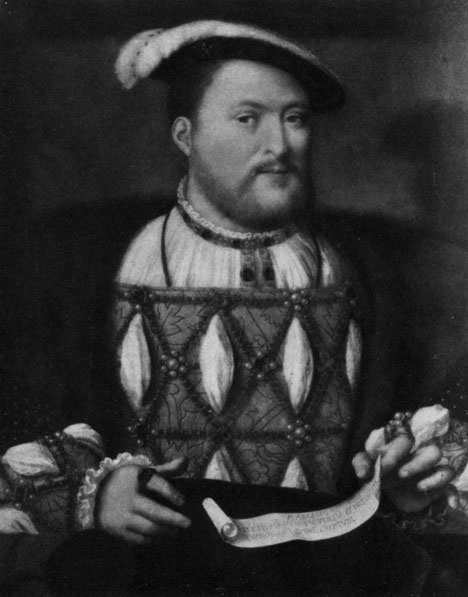THE WIVES OF HENRY THE EIGHTH

HENRY VIII.
From a portrait by Jost Van Cleef in the Royal Collection at Hampton Court Palace
The Wives
of
Henry the Eighth
AND THE PARTS THEY PLAYED
IN HISTORY
BY
MARTIN HUME
AUTHOR OF “THE COURTSHIPS OF QUEEN ELIZABETH”
“THE LOVE AFFAIRS OF MARY QUEEN OF SCOTS”
ETC. ETC. ETC.
| “These are stars indeed, And sometimes falling ones.” —Shakespeare |
LONDON
EVELEIGH NASH
1905
PREFACE
Either by chance or by the peculiar working of our constitution, the QueenConsorts of England have as a rule been nationally important only inproportion to the influence exerted by the political tendencies whichprompted their respective marriages. England has had no Catharine or Mariede Medici, no Elizabeth Farnese, no Catharine of Russia, no Caroline ofNaples, no Maria Luisa of Spain, who, either through the minority of theirsons or the weakness of their husbands, dominated the countries of theiradoption; the Consorts of English Kings having been, in the great majorityof cases, simply domestic helpmates of their husbands and children, withcomparatively small political power or ambition for themselves. Only thosewhose elevation responded to tendencies of a nationally enduringcharacter, or who represented temporarily the active forces in a greatnational struggle, can claim to be powerful political factors in thehistory of our country. The six Consorts of Henry VIII., whose successiverise and fall synchronised with the beginning and progress of theReformation in England, are perhaps those whose fleeting prominence wasmost pregnant of good or evil for the nation and for civilisation atlarge, because they personified causes infinitely more important thanthemselves.
[Pg vi]The careers of these unhappy women have almost invariably been considered,nevertheless, from a purely personal point of view. It is true that themany historians of the Reformation have dwelt upon the rivalry betweenKatharine of Aragon and Anne Boleyn, and their strenuous efforts to gaintheir respective ends; but even in their case their action has usuallybeen regarded as individual in impulse, instead of being, as I believe itwas, prompted or thwarted by political forces and considerations, of whichthe Queens themselves were only partially conscious. The lives of Henry’sConsorts have been related as if each of the six was an isolatedphenomenon that had by chance attracted the desire of a lascivious despot,and in her turn had been deposed when his eye had fallen, equallyfortuitously, upon another woman who pleased his errant fancy better. Thisview I believe to be a superficial and misleading one. I regard Henryhimself not as the far-seeing statesman he is so often depicted for us,sternly resolved from the first to free his country from the yoke of Rome,and pressing forward through a lifetime with his eyes firmly fixed uponthe goal of England’s religious freedom; but rather as a weak, vain,boastful man, the plaything of his passions, which were artfully made useof by rival parties to forward religious and political ends in thestruggle of giants that ended in the Ref